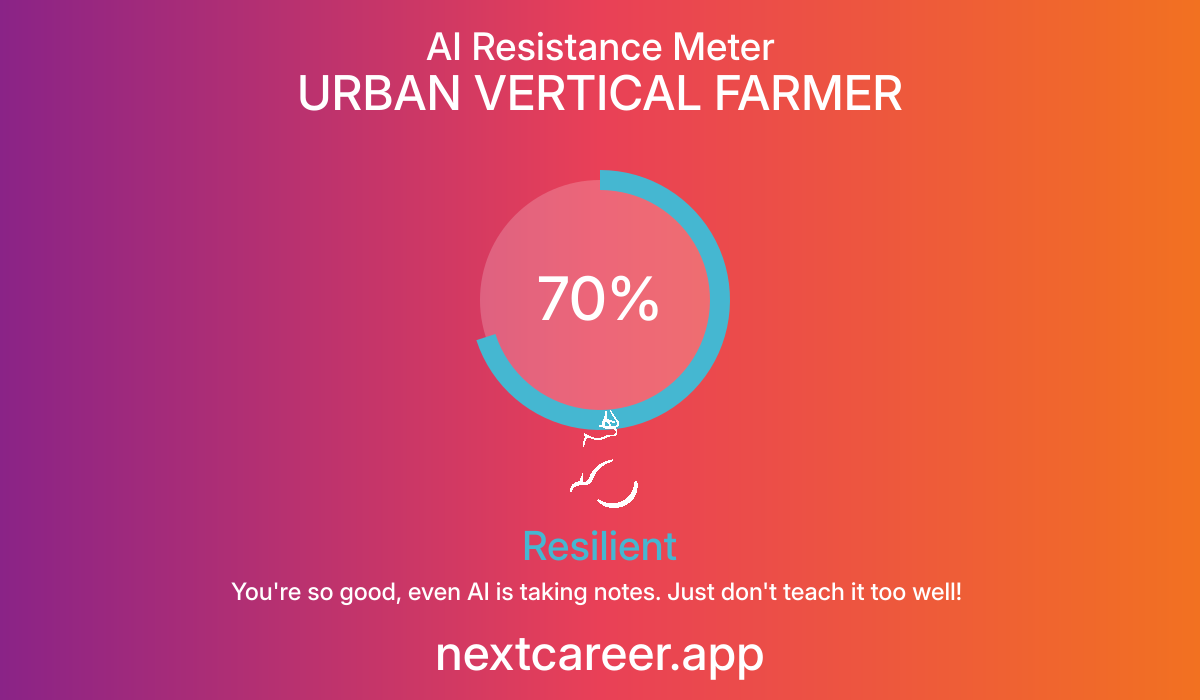AI Resistance Analysis
URBAN VERTICAL FARMER
URBAN VERTICAL FARMER
AI Resistance Score
AI Resistance Meter
Resilient
URBAN VERTICAL FARMER
You're so good, even AI is taking notes. Just don't teach it too well!
The role of Urban Vertical Farmer is relatively well-protected from AI replacement due to the complexities involved in agricultural practices that require human oversight, adaptability to varying conditions, and deep knowledge of local ecosystems. However, the implementation of AI technologies, such as robotics for planting, monitoring, and harvesting, can augment the role, thus changing its scope rather than eliminating it.
The role of Urban Vertical Farmer is relatively well-protected from AI replacement due to the complexities involved in agricultural practices that require human oversight, adaptability to varying conditions, and deep knowledge of local ecosystems. However, the implementation of AI technologies, such as robotics for planting, monitoring, and harvesting, can augment the role, thus changing its scope rather than eliminating it.
Key Factors
- Cognitive tasks: The job requires decision-making based on real-time data regarding crop health, environmental conditions, and resource management, which can be enhanced but not fully replaced by AI.
- Emotional intelligence: Interacting with teams, stakeholders, and even consumers in urban environments requires emotional intelligence that AI cannot replicate.
- Physical skills: Physical tasks in farming will still require human touch, especially in creative problem-solving during crop management.
- Creative thinking: Innovating farming processes or identifying solutions for unique local challenges requires creative insights that AI may assist with but won’t fully replace.
Human Advantages
- Humans possess emotional intelligence and are better equipped to manage nuances in team dynamics and community relationships.
- Creative problem-solving abilities in unique agricultural challenges are an irreplaceable human trait.
- The ability to adapt and innovate based on changing environmental conditions remains a human strength.
AI Vulnerabilities
- Increased automation may reduce the number of manual labor roles available, as robotics manage repetitive tasks more efficiently.
- AI can assist with monitoring and analysis, potentially reducing the need for human oversight in some standardized operations.
Recommended Actions
- Invest in training programs focused on AI tool usage to enhance efficiency and decision-making in farming processes.
- Engage in community outreach to promote urban farming as a sustainable practice, thus fostering societal support and consumer interest.
- Explore partnerships with technology companies to stay ahead of emerging agricultural technologies, ensuring adaptability and understanding of new systems.
In the near term (5 years), urban vertical farming will increasingly integrate AI tools for efficiency, with farmers acting more as managers and innovators. Over the long term (20+ years), the role may evolve to involve data analytics and smart farming strategies, focusing on sustainability and efficiency-driven methods while potentially becoming more collaborative with AI systems.

Why Calculate AI Resistance?
Understanding how AI-resistant your career is becoming increasingly important in today's rapidly evolving job market. Our analysis combines multiple factors including required human skills, technological adaptability, and future industry projections to give you a comprehensive view of your career's sustainability.